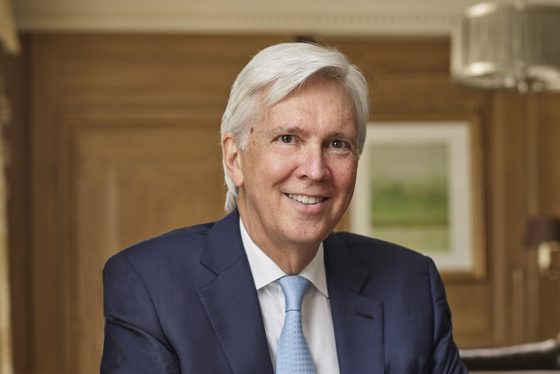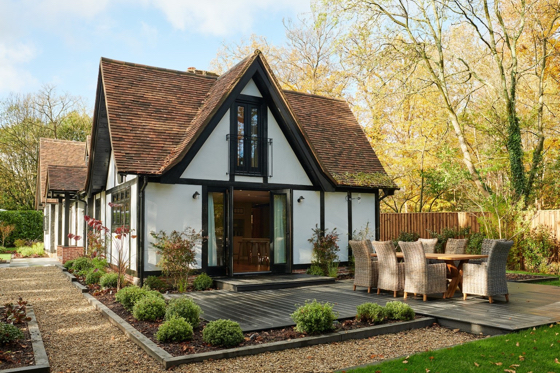Christopher Cowdray is the only executive or manager these days in the Dorchester Collection corporate office in London. Everyone else is back working from home after the COVID-19 spike last month, and while the CEO misses walking the hallways to engage with his team and his core executive team, he told HOTELS two weeks ago that he is managing just fine.
(Part 2 of this interview will be published tomorrow)
The 30-year industry leader originally from Zimbabwe, who has been running the nine-hotel ultra-luxury portfolio since its inception in 2006, is using videoconferencing quite a bit to increase communication and navigate the pandemic. He said if there are a few silver linings to see in the crisis, it is improved communications. Newly scheduled weekly meetings will become a fixture moving forward as engagement has increased dramatically.
“I don’t live too far away and I like to have the space,” said the keeper of the group’s culture focused on the values of passion, personality, respect, working together and creativity. “I have the systems there and everything else, and no one’s disturbing me. So, I also feel my productivity in the office is so much higher than at home. For me, I find it far more stimulating in terms of ideas, what needs to be done, the communication and calls. So, yes, I enjoy the quiet, but I also enjoy being back in the office because it really gives me great focus.”

Since March, for the first time in Cowdray’s 40-year marriage and career, he has a routine that includes exercise and healthier eating. He hasn’t been on an airplane since February and said it’s actually been wonderful to have routine. “To get up in the morning, know what I’m going to do, everything’s where it should be,” he said.
What he does miss is the personal interaction, and he admitted it is not easy to create 2021 budgets via Zoom calls.
“I do miss being able to discuss ideas in detail and look at how people are feeling,” said Cowdray, whose previous roles included general manager of The Dorchester and Claridge’s, London, and general manager of the Al Bustan Palace Hotel, Oman. “You pick up their body language, you understand where maybe they’re not comfortable. Unfortunately, videoconferences don’t really work in that way.”
Cowdray said his main focus through the crisis has been on reassuring his teams as well as telling guests the hotels are ready for them when they are. All team members were assured early on during the pandemic that their jobs would be safe.
“It was to take away that fear,” Cowdray said. “I didn’t want anyone in our organization to have any concern that in a few months’ time they’d be out of a job.”
That’s not to say the group has not worked hard at finding efficiencies, among them cross-training to better control costs.
“I feel in control of the situation from a business point of view,” Cowdray added, even though he described overall hotel performance as awful. The group’s city hotels are performing poorly, he said, while its Ascot, U.K. property, Coworth Park, is doing very well with the stay-cation crowd. “Obviously, I don’t feel in control of what’s happening outside. But on the whole, I feel that the way we’ve set up the company and the ‘We Care’ culture of the Dorchester Collection, and with the alignment and support of ownership, helps make my role that much easier. So, from a personal point of view, I’m in a very positive space.”
HOTELS asked Cowdray numerous questions about the ultraluxury segment, as well as the group’s way forward. Here are some of the thoughts he shared.
HOTELS: What are you doing to prepare to come back stronger than you were before COVID-19?
Christopher Cowdray: We have really solidified our culture even more. What we know is that our 3,500 people around the world do trust and believe in the company. And they have absolutely no reason not to think that because we have demonstrated what we have promised. So, as we go forward, we have a belief from our people, an allegiance from our people, that we’ve looked after them and, therefore, that they will go that extra mile for the company. We’ve seen that happen before and I know that’s going to happen again, particularly for the next few years… That’s also helped us very significantly in terms of our reputation out in the marketplace.
On the guest side, we’ve worked strongly on protocols to make sure that anyone who’s come into our hotels feels that the experience is still one that they would expect in a Dorchester Collection hotel. And that they feel enthusiastic, very at home and comfortable.
We didn’t go out offering discounts and huge promotions. We just went out and said, ‘When you’re ready, we’ll be waiting.’ So, we just kept on these subtle messages, and that has resonated very well with them.

H: How has COVID changed you as a professional?
CC: I’ve always believed in the same principles. Now, it’s all about communication and using the right tools at the right time. In this case, it’s from the beginning given people the confidence and knowledge of where we want to take the company – that we’re not going to be derailed by this.
What happens now is you slow things down a bit in some ways because we generally have become quite frenetic. We’re on planes, we’re going into meetings, we’re meeting staff, we meet guests, industry meetings, whatever. Now, you do slow down and think about things a little bit different. It gives you more time to contemplate and consider the next stage. You also draw on the resources of the people that you have around because you have that time.
H: Who do you turn to for help?
CC: One is my wife, Christine. Throughout my career, she has been very instrumental in being there as a confidant and also to guide, give me advice. She has a great ability to listen to what I have to say and then turn it around and say what options I have. Putting things into perspective is her great ability.
There are only four of us on the executive team and I think we are far more open with each other. We confront the problems together, which is also nice to do and that’s what I really enjoy doing.
H: Have you made any changes to your routine, added any life hacks?
CC: One thing I haven’t done is watched television. I keep abreast of what’s happening on the news, but I find this constant regurgitating or speculation, which is done by the mainstream press, very frustrating. So, I take a little bit more time on my personal finances, which again you tend not to do because you’re moving at great speeds. It’s getting my life a little bit more into perspective, doing a little bit of the reorganization of my own personal life which, particularly in the last 10 years, has really gone a little bit by the by.
H: What have you learned about yourself?
CC: By being able to have that little bit of extra time to actually think things through, that one probably takes a wider perspective on some matters. You can step back, give more trust to your people to deliver… You see how some people have responded and have really responded extremely well under these scenarios. You start to see them in a slightly different light, and that really is good because we’ve had some enormous successes where people have really risen to the occasion.
H: What have been your takeaways and biggest learns from the past nine months?
CC: I think we’ve been able to accomplish a phenomenal amount because the culture by which we have looked after our people and our guests over the years is very solid. Therefore, they trust us because they believe in us. We haven’t done anything which would in any way give them any reason to believe that we don’t have their interests at heart. The guest experience has to be one of it being exceptional, and we want our people to come to work every day believing in us, knowing that they’ve been well looked after and that they have no fears. That’s what really resonating through.
